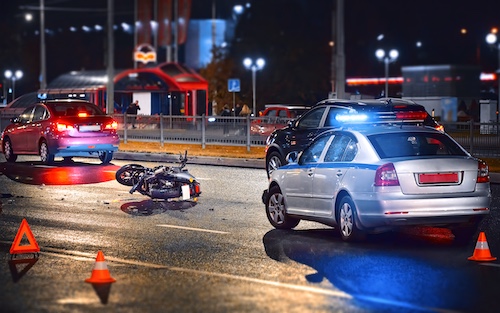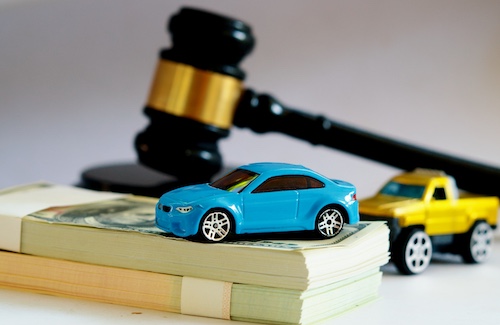Understanding Motorcycle Accidents in North Carolina
Motorcycle accidents in North Carolina often lead to severe injuries or death due to limited protection for riders and high exposure to other vehicles. With hundreds of motorcyclists killed or injured each year, understanding the causes, common injuries, and legal options is critical. Whether the crash involves a left turn, poor road conditions, or another driver’s negligence, the consequences are often life-changing.
In this blog, you’ll learn the top causes of motorcycle crashes, common injuries, and how a Raleigh motorcycle accident lawyer can help you after a collision.
Why Motorcycle Accidents Are So Dangerous
Motorcycle accidents often result in serious injury or death because motorcycles offer little protection in a collision.
Lack of Physical Protection
Motorcycles do not have the safety features found in passenger cars. They lack seat belts, airbags, and steel frames. When a crash happens, the motorcycle rider is directly exposed to the impact. This increases the risk of head injury, spinal injury, and internal trauma. Even at low speeds, motorcycle collisions can cause significant harm.
Visibility Issues and Left Turn Crashes
One of the most common causes of motorcycle crashes is other drivers failing to see the motorcycle. Motorcycles are smaller than other vehicles, and drivers of cars often overlook them, especially at intersections. Left turn accidents are a leading cause of fatal motorcycle crashes. These occur when a car turns left in front of an oncoming motorcycle, often due to misjudging speed or failing to notice the rider.
Road Conditions and Single Vehicle Crashes
Motorcyclists face greater risks from road conditions than other drivers. Uneven pavement, potholes, and debris can cause a motorcycle to lose balance. Many single vehicle crashes involving motorcycles happen because of poor road maintenance. Unlike motor vehicles with four wheels, motorcycles do not have the same stability when road surfaces are damaged or wet.
Impact of Speed and Other Vehicles
Speeding increases the severity of injuries in any crash, but the effects are more severe for motorcyclists. At high speeds, motorcycles are harder to control and crashes are more likely to result in death. Collisions with other vehicles, especially trucks and SUVs, often cause fatal injuries to the motorcycle driver or passenger. These vehicles are heavier and more forceful in a crash.
Helmet Use and Head Injuries
Wearing a helmet is the most effective way to reduce the risk of head injury in motorcycle accidents. According to the National Highway Traffic Safety Administration, helmets reduce the chance of death by about 37 percent. In North Carolina, motorcycle helmet use is required by law for all riders under N.C. Gen. Stat. § 20-140.4. Still, head injuries remain one of the leading causes of death in motorcycle collisions.
Higher Risk Compared to Other Vehicle Types
Motorcycles have a higher fatality rate per vehicle mile traveled than any other vehicle type. Data from the Federal Highway Administration and the Fatality Analysis Reporting System shows that motorcycle riders are overrepresented in traffic deaths. Although motorcycles make up a small portion of registered vehicles, they account for a large share of fatalities. The lack of protection, exposure to road conditions, and size disadvantage in traffic all contribute to this risk.
Most Common Causes of Motorcycle Crashes in North Carolina
Motorcycle crashes in North Carolina often result from preventable factors involving both motorcyclists and other drivers.
Left Turn Accidents
Left turn crashes are one of the most common causes of motorcycle accidents. These usually happen when a car makes a left turn at an intersection in front of an oncoming motorcycle. The driver often fails to see the motorcycle or misjudges its speed. This leads to a direct collision that can cause serious injury or death. Intersections remain high-risk areas for motorcyclists.
Speeding
Speeding is a factor in many fatal motorcycle crashes. Higher speeds reduce the time available to react and increase the force of impact. Both motorcycle drivers and other motorists contribute to this problem. Exceeding speed limits puts all road users at greater risk, especially when visibility or road conditions are poor.
Unsafe Lane Changes
Motorists changing lanes without checking blind spots are a frequent cause of motorcycle collisions. Due to their smaller size, motorcycles are harder to see than passenger cars. When drivers fail to signal or check mirrors, they may sideswipe a motorcycle already in the lane. This often leads to the rider losing control and crashing.
Impaired or Distracted Driving
Drivers under the influence of drugs or alcohol are more likely to cause motorcycle accidents. Impaired judgment and slow reaction times make it harder to avoid crashes. Distracted driving, such as texting or using a phone, also leads to fatal traffic accidents. Both types of behavior reduce awareness of motorcycles on the road.
Following Too Closely
Tailgating is dangerous for all vehicles but especially for motorcycles. When another vehicle follows too closely, it leaves no room for the rider to brake or stop safely. Rear-end collisions involving motorcycles can throw the rider off the bike, causing severe injuries. Maintaining safe distance is critical for motorcycle safety.
Poor Road Conditions
Motorcycles are more sensitive to road defects than other vehicles. Uneven pavement, potholes, gravel, and wet surfaces can cause a motorcycle to lose traction. Many single vehicle crashes happen because of these hazards. The risk is greater for off road motorcycles or those riding in rural areas with limited road maintenance.
Inexperience
Inexperienced riders are more likely to be involved in motorcycle crashes. New riders may not respond quickly to hazards or may overcorrect when faced with a sudden threat. Lack of training and unfamiliarity with traffic rules contribute to avoidable collisions. Rider education and safety courses can reduce this risk.
Common Injuries in North Carolina Motorcycle Collisions
Motorcycle accidents often cause serious injuries due to the lack of protection for the rider.
Head Injuries
Head injuries are one of the leading causes of death in motorcycle crashes. Even with a helmet, a rider can suffer a concussion or traumatic brain injury. The National Highway Traffic Safety Administration reports that helmets reduce the risk of fatal head injury, but they do not eliminate it. Without a helmet, the chance of death or permanent brain damage increases sharply.
Spinal Cord Injuries
Spinal cord injuries can result from high-impact motorcycle collisions. These injuries may cause partial or full paralysis. Damage to the spine affects movement, sensation, and quality of life. Spinal trauma often requires long-term medical care and rehabilitation. These injuries are more common in crashes involving other vehicles or high speeds.
Lower Extremity Injuries
Legs, knees, and feet are frequently injured in motorcycle crashes. These body parts are often exposed during a collision. Riders may suffer broken bones, crushed limbs, or torn ligaments. Surgery is often required, and recovery can take months. Lower extremity injuries can also lead to permanent disability.
Road Rash
Road rash happens when a rider slides across the pavement after a crash. The skin scrapes against the surface and can suffer deep wounds. Severe road rash can lead to infection, scarring, and nerve damage. Protective gear like jackets, pants, and gloves can reduce the severity of these injuries.
Internal Injuries
Motorcycle accidents can also cause internal injuries that are not visible right away. These may include internal bleeding, organ damage, or broken ribs. Internal injuries are dangerous because they can go untreated if not diagnosed quickly. Riders should seek medical attention after any crash, even if they feel fine.
Bone Fractures
Bone fractures are common in motorcycle accidents, especially to the arms, wrists, and ribs. Riders often instinctively use their arms to break a fall, which leads to broken bones. Collisions with other vehicles often cause multiple fractures. Some cases require metal implants or physical therapy to restore function.
Fatal Injuries
Motorcyclists killed in traffic crashes often suffer a combination of severe injuries. The fatality rate for motorcycle riders in North Carolina remains high compared to other vehicle types. According to data from the Fatality Analysis Reporting System, motorcyclists account for a disproportionate share of traffic deaths despite making up a small number of registered vehicles.
Legal Options After a Motorcycle Collision
Motorcycle accident victims in North Carolina have specific legal rights and options depending on the cause and severity of the crash.
Determining Fault
Fault in a motorcycle collision must be clearly established to pursue a claim. Police reports, witness statements, and traffic camera footage can support the case. If the crash involved other motorists who violated traffic laws, they may be held responsible. In North Carolina, a driver who failed to yield, ran a red light, or changed lanes unsafely may be at fault.
Contributory Negligence Rule
North Carolina follows a strict contributory negligence law under N.C. Gen. Stat. § 1-139. If a motorcycle driver is found even one percent at fault, they may be barred from recovering damages. This rule makes it important to gather strong evidence and avoid making statements that admit any fault at the scene.
Types of Compensation
A motorcycle accident lawyer can help injured riders seek compensation for:
- Medical expenses
- Lost wages
- Pain and suffering
- Motorcycle repair or replacement
In fatal motorcycle crashes, surviving family members may file a wrongful death claim for funeral costs and loss of income.
Role of Insurance
Insurance plays a central role in motorcycle accident claims. Victims may seek coverage through the at-fault driver’s liability insurance. If the other driver is uninsured or underinsured, a claim can be filed under the rider’s own policy. Understanding the coverage limits and exclusions is key to a successful claim.
Government Liability
In some cases, a crash may result from poor road conditions like uneven pavement or missing signs. If a government agency failed to maintain safe roads, it may be held liable. Claims against public entities must follow specific procedures and timelines, which a motorcycle accident attorney can manage.
Importance of Legal Representation
Motorcycle crashes often involve serious injuries and high financial stakes. A motorcycle accident attorney can protect a rider’s rights, manage communication with insurers, and present a strong case. Legal guidance is especially important under North Carolina’s contributory negligence system, where proving full fault of the other party is required.
Contact an Experienced Raleigh Motorcycle Accident Lawyer Today!
If you’ve been injured in a motorcycle accident, don’t wait to get the help you need. Our team at Mogy Law is here to support you every step of the way. A dedicated Raleigh motorcycle accident lawyer can evaluate your case, handle the legal process, and fight for the full compensation you are owed.
Contact us at (901) 443-9133 for a free case consultation today!








